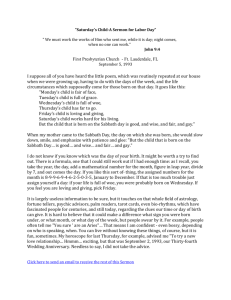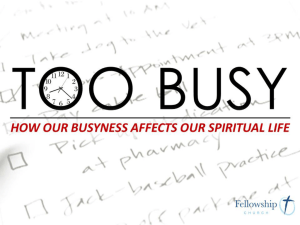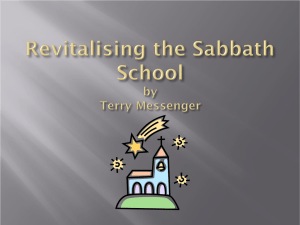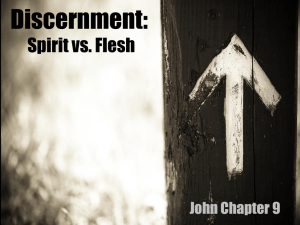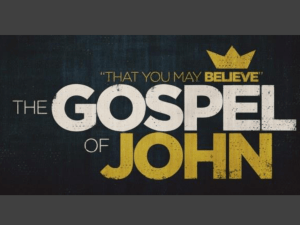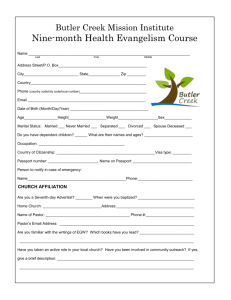Consider three observations and five things Jesus
advertisement
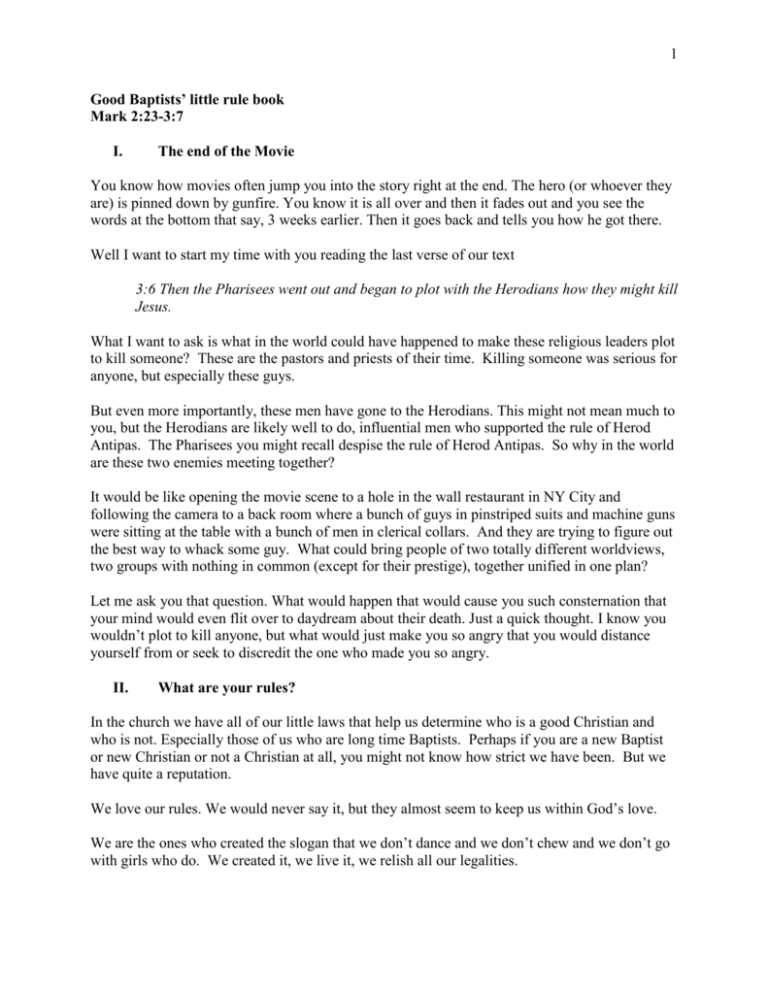
1 Good Baptists’ little rule book Mark 2:23-3:7 I. The end of the Movie You know how movies often jump you into the story right at the end. The hero (or whoever they are) is pinned down by gunfire. You know it is all over and then it fades out and you see the words at the bottom that say, 3 weeks earlier. Then it goes back and tells you how he got there. Well I want to start my time with you reading the last verse of our text 3:6 Then the Pharisees went out and began to plot with the Herodians how they might kill Jesus. What I want to ask is what in the world could have happened to make these religious leaders plot to kill someone? These are the pastors and priests of their time. Killing someone was serious for anyone, but especially these guys. But even more importantly, these men have gone to the Herodians. This might not mean much to you, but the Herodians are likely well to do, influential men who supported the rule of Herod Antipas. The Pharisees you might recall despise the rule of Herod Antipas. So why in the world are these two enemies meeting together? It would be like opening the movie scene to a hole in the wall restaurant in NY City and following the camera to a back room where a bunch of guys in pinstriped suits and machine guns were sitting at the table with a bunch of men in clerical collars. And they are trying to figure out the best way to whack some guy. What could bring people of two totally different worldviews, two groups with nothing in common (except for their prestige), together unified in one plan? Let me ask you that question. What would happen that would cause you such consternation that your mind would even flit over to daydream about their death. Just a quick thought. I know you wouldn’t plot to kill anyone, but what would just make you so angry that you would distance yourself from or seek to discredit the one who made you so angry. II. What are your rules? In the church we have all of our little laws that help us determine who is a good Christian and who is not. Especially those of us who are long time Baptists. Perhaps if you are a new Baptist or new Christian or not a Christian at all, you might not know how strict we have been. But we have quite a reputation. We love our rules. We would never say it, but they almost seem to keep us within God’s love. We are the ones who created the slogan that we don’t dance and we don’t chew and we don’t go with girls who do. We created it, we live it, we relish all our legalities. 2 We don’t listen to heavy metal music, rap, or perhaps anything not blatantly praising God. Secular music in any form is evidence of spiritual immaturity We never ever touch any form of alcohol We never smoke cigars We never vote Democratic We don’t do anything that’s too flashy in church (i.e., playing electric guitar, use of multimedia, etc.); that’s “worldly” We don’t use modern or paraphrase translations of the Bible; only “word for word” translations (like there is such a thing). After all if the KJV was good enough for Paul it is good enough for us. Before this sermon is over I hope you leave with two very important thoughts. 1. None of those things defines what a Christian is 2. Jesus is way bigger than any of our rules Let me read our text this morning. Its from Mark 2:23-3:6 23 One Sabbath Jesus was going through the grainfields, and as his disciples walked along, they began to pick some heads of grain. 24 The Pharisees said to him, "Look, why are they doing what is unlawful on the Sabbath?" 25 He answered, "Have you never read what David did when he and his companions were hungry and in need? 26 In the days of Abiathar the high priest, he entered the house of God and ate the consecrated bread, which is lawful only for priests to eat. And he also gave some to his companions." 27 Then he said to them, "The Sabbath was made for man, not man for the Sabbath. 28 So the Son of Man is Lord even of the Sabbath." NIV Mark 3:1 Another time he went into the synagogue, and a man with a shriveled hand was there. 2 Some of them were looking for a reason to accuse Jesus, so they watched him closely to see if he would heal him on the Sabbath. 3 Jesus said to the man with the shriveled hand, "Stand up in front of everyone." 4 Then Jesus asked them, "Which is lawful on the Sabbath: to do good or to do evil, to save life or to kill?" But they remained silent. 5 He looked around at them in anger and, deeply distressed at their stubborn hearts, said to the man, "Stretch out your hand." He stretched it out, and his hand was completely restored. 6 Then the Pharisees went out and began to plot with the Herodians how they might kill Jesus. Pray Okay, so we have seen the end of the movie. The Pharisees are so enticed by Jesus that they are willing to team up with their arch enemies to destroy him. 3 Now we see at the bottom of the screen “Some time earlier.” I don’t know if it was 2 weeks or much longer. Two separate stories have come together in the literature because of their common theme—breaking the Sabbath law. Now remember our context. Jesus has just told them that their understanding of fasting was faulty. After all, the bridegroom is there and their can be no sadness while he is present. He is reversing all their thinking and the Pharisees are not happy. Now he is doing it again. III. Sabbath restrictions Mark tells us that Jesus and his disciples were walking along through a field and the disciples begin to pick some grain. Cutting through fields was perfectly acceptable for travelers as was picking the grain and eating it. But there is at least one significant problem. They are doing it on the Sabbath day. There are rules for the Sabbath day. In fact the Mishnah has an entire tractate full of rules with every conceivable possibility you can muster. These casuistic laws (case laws) continued to be written down for who knows how long so that everything was eventually written and secured. The Dead Sea Scrolls forbade even the carrying of children, giving of help to birthing animals, or the retrieval of an animal fallen into a pit on the Sabbath The Rabbis had more laws than you can imagine. There were 39 classes of work that profane the Sabbath, including ones you might suspect like plowing, hunting and butchering. But also ones like tying and loosing knots, sewing more than on stitch, or writing more than on letter (m. shab 7.2) Good Jews would. . . Never begin work that might carry over into the Sabbath Do no unnecessary work; that is anything that is not life or death related. Not set a dislocated foot or hand (m. Shab 22:6) Not repair a fallen roof (though you could temporarily prop it up; m. Shab 23:5) If a building fell down on the Sabbath, enough rubble could be removed to discover if any victims were dead or alive. If alive they could be rescued, but if dead, the corpse must be left until sunset (m. yoma 8:7) And the disciples have broken these laws. At least the harvesting law and most probably the traveling law. They could only go 800 meters on the Sabbath before it became work and profaned the day. Now before you laugh or mock too much, we should for a moment notice what is behind this. The Sabbath is very important to the Jews. God had said for them to keep the Sabbath holy, and to do it by not working—not even animals and servants could work on this day. There is something very right about the Pharisees rules. It is not the rules in and of themselves that are wrong. We will get back to that in a moment 4 Apparently though, Jesus disciples aren’t following the law. And Jesus seems to agree. Although he implicitly agrees that the disciples are breaking the Pharisees law, he has something to say about it. 25 He answered, "Have you never read what David did when he and his companions were hungry and in need? 26 In the days of Abiathar the high priest, he entered the house of God and ate the consecrated bread, which is lawful only for priests to eat. And he also gave some to his companions." IV. What does David have to do with anything? This passage has some controversy surrounding it. First, this story didn’t happen when Abiathar was the priest. It was Ahimilech. Many argue that here is a reason not to hold to inerrancy. I think, rather we need to understand this as the normal rabinnical way of citing a passage. They didn’t have chapter and verse back then and so it should be read something like, “in the passage about Abiathar.” Abiathar was a far more famous priest and the story of his son Ahimilech immediately follows his own story. The bigger question is how in the world does this have anything to do with the problem? Mark says nothing about this happening on the Sabbath. Well, you should know that rabbinic tradition sees this as happening on the Sabbath so perhaps Jesus was referring to that tradition. But I think the connection is that David had men and Jesus had men; and both sets of men did something that looked wrong. Both times pious men did something forbidden. Jesus seems to suggest that since David wasn’t condemned, why should he be? Perhaps the Pharisees laws are a bit too strict. After all, the Sabbath was made for man, it is meant to be a blessing and servant of us. Not to restrict and make us miserable. David had a need and that took precedence over ceremony. Mercy is of utmost importance, Matthew says. Now let me skip the parenthetical verse 28 just for a moment. V. Is it lawful to do good on the Sabbath? The story continues that another Sabbath day and another infraction of the law. Being watched very closely by the Pharisees, Jesus puts a man with a shriveled hand on display. Interestingly, it doesn’t even say the man is looking to be healed. Jesus pulls him out and makes him stand in front of everyone. He does this to make a huge point. He asks whether it is lawful to do good on the Sabbath. In Matthew it says those accusers were the ones who prompted the discussion, but either way what is implicit in Mark, is explicit in Matthew—clearly “it is lawful to do good on the Sabbath.” 5 Jesus then looks around in anger and, distressed at their stubborn hearts, heals the man. We end the stories where we began—the Pharisees are trying to destroy Jesus. Basically, the religious leaders want to kill Jesus because he is calling them legalists and he is threatening to undo their entire system. VI. How important is the Sabbath? So let me ask you, “How important is the Sabbath?” My answer is that it is of utmost importance. Few things could compare in importance. I am not one who thinks the Sabbath law is Old Testament and therefore done away with. I am convinced that we are to continue to keep the Sabbath holy. Remember that the Sabbath was in celebration of creation in Genesis 2. In Exodus it was celebrated in association with the redemption from Egypt. That shift was actually very subtle and not really a shift at all, for the Exodus was nothing more than a new creation. A recreation of a new people holy and set apart and ready to enter the new garden of Eden, the promised land and be in the presence of God forever. The Sabbath made a more significant shift in the NT with the death and resurrection of Christ, but we still celebrate the Creation/redemption. Jesus resurrection is the ultimate creation act. The ultimate redemption act. He is that to which the OT creation and redemption pointed. So now we celebrate creation on Sunday in anticipation of the ultimate redemption. But even now we live in God’s presence. The Holy Spirit lives in us. We have not ultimately arrived of course. We have already, but not yet inherited the kingdom. The full blessing is not yet and so we await a final rest. I don’t think that is what the text is about, but I want to be sure you get that re-creation theology deep in your psyche. You might find, as I did, that it helps put the dots together on the entire NT. I think one of the important things Mark is trying to get across is that our rules cannot be for the sake of rules. As Christians we must not be known for what we are against, but we must be about love and mercy. In fact, in Matthew it makes that abundantly clearer—“I desire mercy, not sacrifice. . . it is lawful to do good on the Sabbath.” VII. Sin and sin boldly Those of you who have little conservative hang ups, I think the Bible is reminding you that legalism is as much a sin as anything else. If you insist that those who drink alcohol are somehow less holy than you are. Or churches that have drums are less mature. Or those who baptize babies aren’t real Christians. 6 I wonder sometimes if this is our problem. I would rather preach Corinthians and its overrealized eschatology to you because I feel like our congregation may need a few more laws. Not laws as much as realizing that our life reflects Jesus and we must be about good works. But perhaps you have struggled with seeing the whole world as black and white. You have an opinion on everything and you know if it is a sin or not. Gray is not a color that you embrace or even believe exists. Perhaps you need a pastor to tell you openly, go and sin a little bit. I am not telling you to do that, but I had a professor named Steve Brown who did a radio show called Key Life and when someone would call in to his show and say something he appreciated, he would reward them with free sins. He would say, “You have three free sins.” Of course, he didn’t really mean that but he was trying to remind the people that our Christian life is not about law, but about grace. Martin Luther said, “Be a sinner and sin boldly!” Please remember this above all else, we are not saved by the keeping of every little law. Luther also said, Be a sinner and sin boldly, but believe and rejoice in Christ even more boldly. For he is victorious over sin, death, and the world.1 Jesus conquered sin, death and the world. That is what our Christianity is about, not our perfectly abiding by the law. And God is not pleased if we look down on those who don’t abide to our understanding of the law. We are not permitted to bind each others consciences. I want to make perfectly clear that I am not saying that the older generation is wrong and we young guys and our newer ways are right. On the other hand, I look more like the older generation in many of my patterns, but that doesn’t mean they are right either. If you are convicted about something I am not telling you that you need to be more liberal like me or even more conservative like me. I am trying to say that those things don’t define our Christian relationship. Our salvation is by his grace alone and not based on our works at all. We all have our things that rub us wrong. Our untouchables. We Baptists wouldn’t have a bible study in a bar. That would be sacreligious somehow. (I would by the way). Some of us wouldn’t even step foot in a bar, or a place that sells liquor. I used to go regularly into the beer and wine place in Poolesville before it went to new ownership. I wanted to make a relationship with that man. I remember Tony Campolo telling a great story of when he flew into Honolulu and unable to sleep, he decided to grab a snack at an all night diner. He overheard a group of hookers chatting and one mentioned that it was going to be her 39th birthday tomorrow. They teased her saying “what do you want, a party?” Of course she went quiet saying lowly that she had never had one 1 Let Your Sins Be Strong: A Letter From Luther to Melanchthon Letter no. 99, 1 August 1521, From the Wartburg (Segment) Translated by Erika Bullmann Flores from: _Dr. Martin Luther's Saemmtliche Schriften_ Dr, Johannes Georg Walch, Ed. (St. Louis: Concordia Publishing House, N.D.), Vol. 15,cols. 2585-2590, column 13. 7 her entire life, why would she ever expect one now. Campolo grabbed the owner of the diner and conspired with him to have a party the very next night. They had a cake and they yelled surprise and the woman was absolutely astonished. How amazing that this stranger would do that. She humbly requested to take the rest of the cake home and after she left Campolo prayed outloud for her—that she would be saved, that her life would change and that God would be good to her. The diner owner couldn’t believe Tony was a Christian and asked him what kind of a church he belonged to. His answer: “the kind of church that threw birthday parties for prostitutes at 3:30 in the morning. What do you think about that? Non-Christians would surely believe there is no church like that. Even Christians may want nothing to do with that kind of thing. After all, these are sinners and we have our rules and we have our patterns and we stick to them and God help you if you ever question the way we have always done it. And if this is you, I think verse 5 may be for you, Jesus looks around angry and distressed at stubborn hearts I don’t think that is most of us. Maybe a little, but mostly I have been so impressed with this congregation in regard to what is often called the worship wars. It’s a war because everyone has their preference and sometimes those preferences seem to be MANDATED by God. We have taught you new words and new tunes and in many congregations people would just leave when something was different. But you have weathered well. I think this body may be the kind of group that would throw a birthday party for a prostitute and take a homosexual to dinner and may even vote democratic. I don’t want to say much about the Sabbath itself today in regard to “do’s” and “do nots.” I want to refer you to my sermon on Keeping the Sabbath holy from Exodus 20 if you want to understand that more, but let me take you back to the text for one more point VIII. Lord of the Sabbath Look at the last verse of chapter 2. I believe this is Mark making an extremely huge theological point for his readers after Jesus was already gone. 28 So the Son of Man is Lord even of the Sabbath." The Son of man is lord of the Sabbath. What does that mean? Some suggest that son of man is just another way of saying human being. In other words, it comes right from vs 27 saying that Sabbath was made for man, so therefore man is lord of the Sabbath. But if this was the case the logic would be strange. It would be nothing more than a simple tautology and not an argument at all. After all, why would the Pharisees bother to bring it up then? I think, rather, that Mark is making very clear what the authority of Jesus really is. Its divine authority. 8 David, the great king, was the inaugurator of a future messianic reign that would be even more glorious than his historical reign. Jesus is inviting comparison between himself and Israel’s royal messianic prototype—David. Jesus is presuming preeminence over the Sabbath. If David was not judged for breaking the law, how much more Jesus? Jesus authority is over everything. Once again, we have an opposition story that ends with Mark letting everyone know that when Jesus speaks it is done. When he acts, no one has the authority to question it. He says something and that is it. He has authority over men in boats, over paralysis, over leprosy, over fevers, over demons and over the very Sabbath itself. Jesus is not just a greater king than David, he is the maker, owner and rule-giver for the Sabbath. It belongs to Jesus and he decides how it works. IX. What is true Christianity? My friend, if you are here and all you know about Christianity is a bunch of rules, let me assure you that you have us all wrong. Perhaps we sometimes make our life about the rules and look down on others, but that is just despicable and we are wrong when we do that. Remember, we don’t claim to be perfect, in fact far from it. We claim to be just as big a mess as anyone else. The difference is that we have Jesus. That’s what this whole text has been about. No Christian here is trying to do good to get to heaven. All of our stupid rules are irrelevant. We cant boast in keeping the Sabbath. We cant boast in anything really. All we can really boast in is that Jesus Christ died for our sins so we wouldn’t have to pay the cost. Its not technically a boast at all—its us looking right past ourselves and to the cross of Christ. After all, we fail to keep the Sabbath holy all the time, but praise God he is Lord of the Sabbath and fulfilled the Sabbath and offers us future and present rest. My friends, how do you celebrate that Sabbath rest we have. Are you going from here to your job? Are you going home to clean the house? It would be terrible for me to now judge you for those actions, but I need to ask you if you think these are deeds of love and mercy. Are you celebrating joyfully the resurrection of Christ who has fulfilled the law by acts of love and mercy? Think about that as we pray. 9 Extra stuff: Extremes of legalism and antinomianism are both to be avoided. The law is not here regarded as an autonomous revelation, which in legalism tends to replace the person of God. Nor is Jesus a free agent who abrogates the Sabbath or the moral order or the revealed will of God, as in Antinomianism. The righteous purpose of God as manifested in the Torah can be recovered and fulfilled only in relation to Jesus, who is its Lord.
